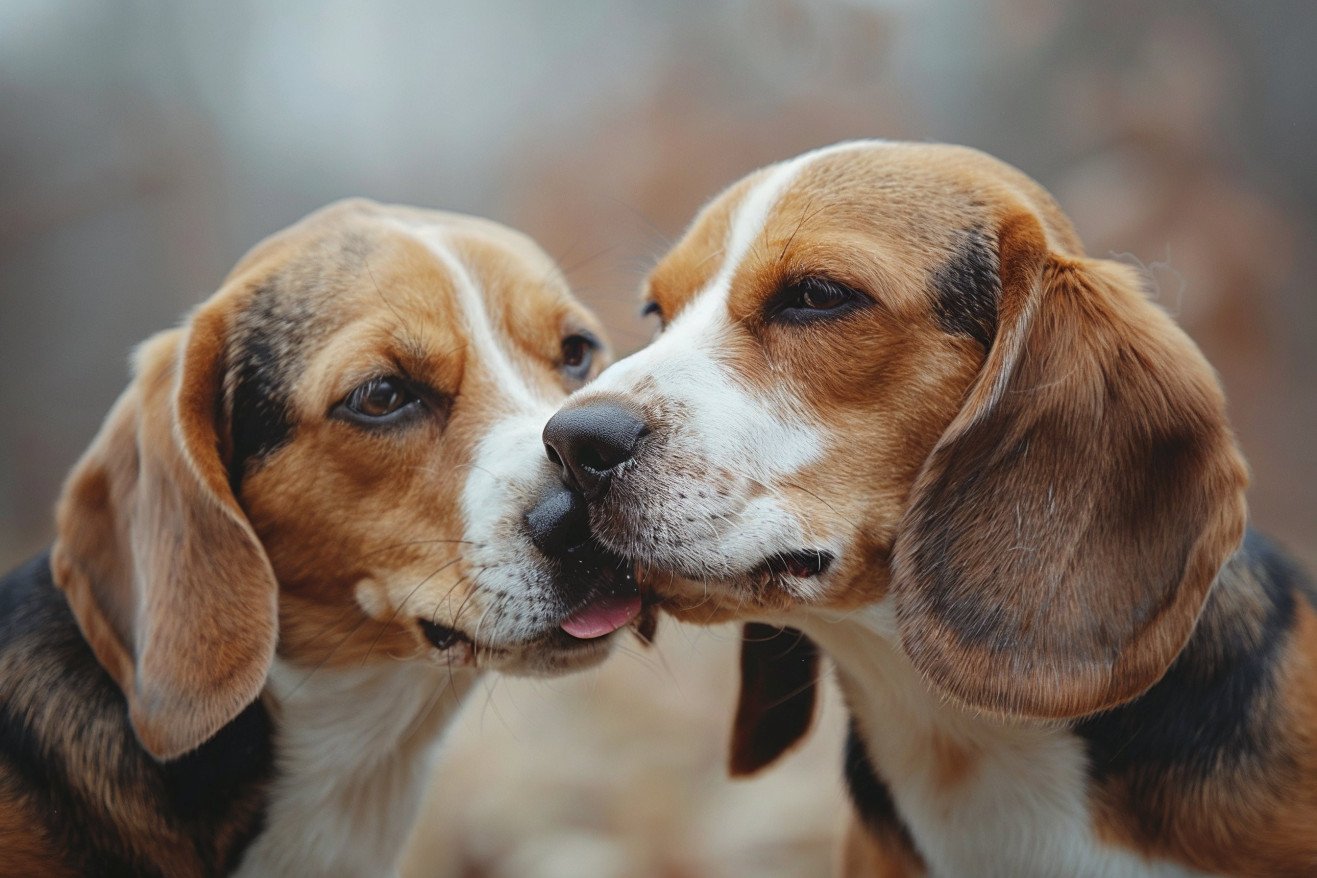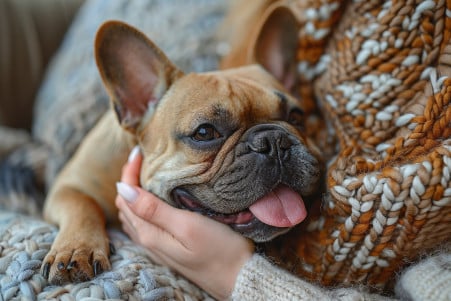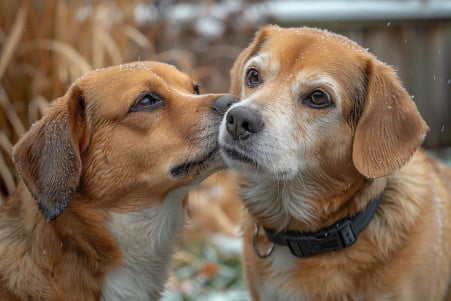Why Do Dogs Lick Each Other's Mouths? The Biological Reasons
17 April 2024 • Updated 17 April 2024

While it may be a little off-putting, dogs licking each other's mouths is a completely normal social behavior that can be traced back to their pack mentality and natural instincts. Dogs lick each other's mouths to show submission to a higher-ranking pack member, strengthen social bonds, and learn more about the other dog or their recent activities through their scent and taste.
In this article, we will delve into the interesting biological and evolutionary reasons for this dog behavior. Drawing from studies in animal behavior, evolutionary biology, and veterinary science, we will delve into the complex social signals and forms of communication that dogs use when they lick each other's mouths. This in-depth exploration will give you a better understanding of the secret life of dogs and the many layers of even the simplest dog behaviors.
Why do dogs lick each other's mouths?
The Evolutionary Origins of Mouth-Licking Behavior
Mouth-licking behavior in dogs can be traced back to their ancestral pack dynamics and social hierarchies. As Psychology Today points out, in the wild, lower-ranking pack members would lick the mouths of more dominant dogs to show submission and respect. This helped keep the peace within the pack and avoided conflicts over resources or territory.
This instinctual behavior has carried over to domesticated dogs, where it is used to show social status and to create peaceful relationships with other dogs and humans. Puppies start licking and grooming themselves and their littermates early in life, which helps build social bonds through mutual satisfaction, according to the same Psychology Today article. As they grow up, the licking becomes a ritualized behavior that shows friendliness, non-threat, and a submissive request for acceptance.
The evolutionary benefits of this licking behavior have been widely researched. A study published in ScienceDirect discovered that dogs licked their mouths more often when they were shown negative facial expressions by other dogs or humans. This indicates that licking has evolved as a way to keep the peace and avoid conflicts within a pack. This inborn behavior helps dogs work together by allowing them to show submission and non-threat to higher-ranking members.
Mouth-Licking as a Sign of Communication and Bonding
Mouth-licking is a form of non-verbal communication that dogs use to express a range of messages and intentions. According to SpiritDog Training, licking can be a way for dogs to show affection and bond, especially when an older dog is being protective of a younger dog. It can also be a way for dogs to ask for playtime or to apologize after a fight, which is known as appeasement behavior.
As the PawSafe article notes, mouth-licking releases endorphins in dogs, which can help them feel more relaxed and happy. This has led researchers to look at the social aspects of the behavior and how it can help dogs bond with their owners and other dogs.
As Rover.com notes, dogs may lick each other's faces to show affection and to groom, not just to appease. In this case, the older or more dominant dog is the one doing the licking, which shows that the bond between the two dogs is more important than their place in the social hierarchy.
In general, mouth-licking is a multifaceted behavior that dogs use to communicate, bond, and establish social relationships. Recognizing these different aspects of the behavior can help you better understand the complex emotional lives of your furry friends.
Excessive Lip Licking in Dogs: What It Could Mean and When to Worry
While the occasional lip lick is a normal social behavior in dogs, excessive or repetitive licking can be a sign of an underlying problem. According to Dr. Buzby's ToeGrips for Dogs, some of the potential reasons for excessive lip licking include dental issues, nausea, allergies, anxiety, or obsessive-compulsive disorder (OCD).
Dogs may also lick their lips excessively due to boredom, stress, or in response to negative emotional expressions from other dogs or humans, according to the PetHelpful article. The Native Pet explains that excessive lip licking can be a sign of an underlying health condition, such as gastrointestinal issues or allergies.
No matter the reason for the behavior, excessive lip licking can lead to skin problems, hair loss, and the potential for bacteria or parasites to be spread. As the Psychology Today article points out, if a dog is engaging in abnormal or compulsive licking, it's important to take them to the vet to determine the cause and get treatment.
How to Stop and Train Dogs to Lick Less
If your dog’s licking behavior is excessive or problematic, it’s important to manage and train your dog to stop or reduce the behavior. According to The Village Vets, one of the most common reasons for excessive lip licking in dogs is stress. When dogs are stressed, licking can be a way to self-soothe. In these cases, it’s important to identify and treat the underlying issue, whether it’s a medical or behavioral problem.
To reduce licking that’s caused by boredom, Wag! recommends increasing the amount of enrichment, exercise, and mental stimulation your dog gets. In addition, positive reinforcement training can be used to train dogs to do something else and focus on that instead of licking. The Whole Dog Journal suggests training dogs to do something else with their mouths, such as chewing on a toy or working on a food-stuffed puzzle.
In some cases, you may need to get help from a professional, such as a veterinarian, veterinary behaviorist, or dog trainer to manage and treat compulsive or severe licking. According to the Whole Dog Journal, if your dog’s licking is compulsive, it may be a sign of Obsessive Compulsive Disorder (OCD) and require specialized treatment. However, by identifying the cause and using appropriate training methods, dog owners can help their dogs overcome excessive licking and maintain a healthy, happy relationship.
Conclusion: What Mouth-Licking Means in Dogs
While some dogs may lick their lips as a sign of submission, others may do it to communicate a need or desire to their owners. In some cases, dogs may lick their lips as a response to stress or anxiety, while in other cases, it may be a sign of a medical issue.
According to Dr. Buzby's ToeGrips for Dogs, potential reasons for excessive lip licking in dogs include dental issues, nausea, allergies, anxiety, or obsessive-compulsive disorder (OCD).
Other reasons for excessive lip licking in dogs include boredom, stress, or a reaction to negative emotional cues from other dogs or humans, according to PetHelpful. Meanwhile, the Native Pet explains that excessive lip licking can be a sign of an underlying health condition, such as gastrointestinal issues or allergies.
In any case, excessive lip licking can result in skin issues, hair loss, and the potential for the spread of bacteria or parasites. As the Psychology Today article points out, if a dog is engaging in abnormal or compulsive licking, it's important to have them evaluated by a vet to determine and treat the cause.
By learning more about why dogs lick their mouths, we can better understand the rich emotional lives of our pets and the many ways they communicate with each other and with us. At the same time, it's also important to know when this behavior is a sign of an underlying issue and to take steps to address it.
In the end, this overview of mouth-licking in dogs shows how important it is to appreciate and understand the many ways dogs communicate and express themselves.


